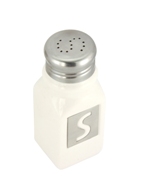Sea Salt vs Table Salt
Sea salt vs Table Salt – Which is better?
This is a question I had asked myself several times before and got asked several times too. Here’s some information on sea salt vs table salt – the differences and similarities.
Sea salt and table salt have the same basic nutritional value. Both mostly consist of two types of minerals — sodium and chloride. However, sea salt is often marketed as a more natural and a healthy alternative. The real differences between sea salt and table salt are in their taste, texture and processing, but not really in their chemical makeup.
Sea Salt vs Table Salt by Flavour and Colour

Sea salt is produced through evaporation of seawater, usually with little processing, which leaves behind some trace minerals and elements depending on its water source. These insignificant amounts of minerals add flavour and colour to sea salt, which also comes in a variety of coarseness levels.
Table salt is mined from underground salt deposits. Table salt is more heavily processed to eliminate trace minerals and usually contains an additive to prevent clumping. Most table salt also has added iodine, an essential nutrient that appears naturally in minute amounts in sea salt.
Another thing to consider when choosing between table salt vs sea salt, is the iodine that’s usually added to table salt. Iodine in the diet is important. Although if you eat a wide variety of foods and ensure you retain the nutrition and nutritional value of the foods, then you are bound to get this iodine naturally from food. That’s what the case should be really, but the iodine content of table salt is worth mentioning. Iodine deficiency can lead to goitre and other mental illnesses.
Because table salt is processed, it would be fair to say it contains more additives.
Looking at salt by weight, sea salt and table salt contain about the same amount of sodium chloride. Your body needs only a couple hundred milligrams (mg) a day to stay healthy, but most people get far too much — mostly from sodium in processed foods.
So regardless of which type of salt you prefer, keep sodium consumption to a minimum to stay a healthy adult. People with high blood pressure, African-Americans and anyone middle-aged or older should aim for the lower end of the recommended range, which can vary slightly between countries.
Summary of Sea Salt vs Table Salt
Salt is characterize mainly sodium and chlorine. Sea salt and table salt basically have the same amount of sodium in them. However, sea salt is evaporated from sea water. Sea salt contains some extra minerals that table salt may not have. Sea salt is also often coarser than table salt, and table salt would usually contain some more iodine. Iodine helps your thyroid to function better.
Which is Better?
Sea salt is better for the body Not rated yet
Sea salt is better for your body healthwise. Sea salt does not hold water in the body which can accumulate around your heart and cause you to have high …
The information here is for general guidance only.
Talk to your doctor before making any changes to your diet and lifestyle.



Leave a Reply